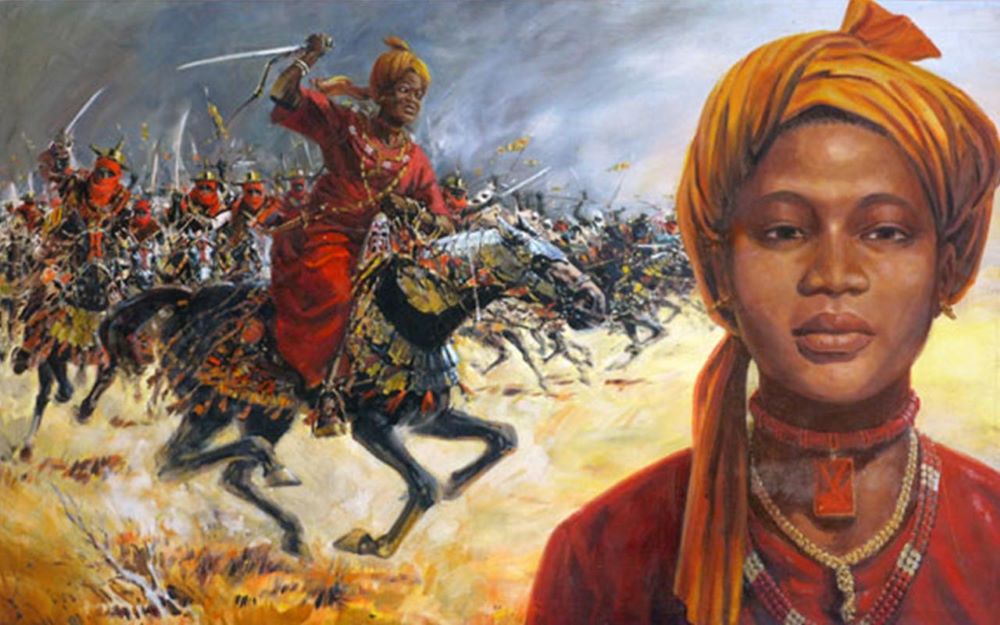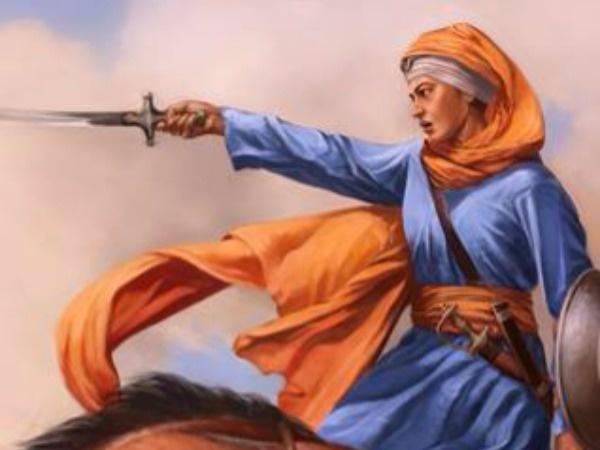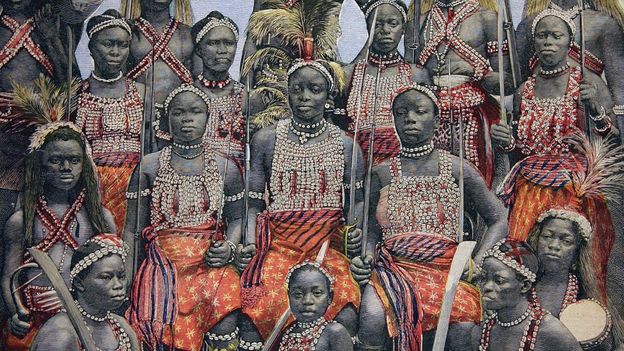
Throughout the history, women have played diverse roles in times of war and peace
Syeda Anmol Ali
Throughout the history, women have played diverse roles in times of war and peace. Despite facing significant societal and cultural barriers, many women have made remarkable contributions to their countries during times of conflict. But when we talk about wars, we always think of men. Such a scene comes to mind where men are fighting the battles holding weapons in their hands.
No one thinks about what the role women have been playing in the war? Why women are not considered capable of fighting the wars for safeguarding the nation and the state? And why is war always considered to be fought in one field? There are different types of war. Every step taken to defend oneself is ‘war’. Every work that involves hope, patience, and hard work from the beginning to the end is a ‘war’, whether it is mental, physical or emotional.
 What is a woman’s ‘war’? The first war of a woman is to give birth to a human being – A battle fought between life and death. A man may be a warrior at battle field, but a woman is warrior all her life during war and peace fighting at multiple fronts.
What is a woman’s ‘war’? The first war of a woman is to give birth to a human being – A battle fought between life and death. A man may be a warrior at battle field, but a woman is warrior all her life during war and peace fighting at multiple fronts.
According to ancient history, in 13th century BCE – the estimated time of the Trojan War, several women participated in battle. In Greek mythology, Epipole, daughter of Trachion, of Carystus in Euboea, in the disguise of a man, went with the Greeks against Troy, but when Palamedes discovered her sex, she was stoned to death by the Greek army.
Another history account says that Hatshepsut, also spelled Hatchepsut, female king of Egypt (reigned in her own right c. 1473–58 BCE) attained unprecedented power adopting the full titles and regalia of a pharaoh. She led military campaigns against Nubia and Canaan.
 In 17th century BCE, Queen Ahhotep I is credited for having pulled Egypt together, having cared for its army, having guarded it, having brought back those who fled, gathering up its deserters, subduing those who defy her. Ahhotep is buried with a dagger and axe, as well as three golden fly pendants, which were given as rewards for military valor.
In 17th century BCE, Queen Ahhotep I is credited for having pulled Egypt together, having cared for its army, having guarded it, having brought back those who fled, gathering up its deserters, subduing those who defy her. Ahhotep is buried with a dagger and axe, as well as three golden fly pendants, which were given as rewards for military valor.
The modern day history is also full of examples of the role played by women. The main role they played in World War I (1914-1918) was employment in munitions factories, farming, and other roles to replace men drafted for the army. Women played an important role in making the system of food rationing. They sewed bandages, rubbed cowpat as ‘medicine’ and other medical equipment for the soldiers. Nursing became a major role starting in the middle of 19th century. World War II (1939-1945) marked a decisive turning point, with millions of women handling important home front roles, such as working in munitions factories and otherwise replacing drafted men. Volunteer roles expanded. The most dramatic new change was millions of women in regular military units.
Recent works by a number of anthropologists, such as Barbara Smuts, Richard Wrangham, and psychologist Anne Campbel provide lot of stuff on women’s role and gender differences. These researchers have shed new light on the development of pair bonding, the pre-human history of warfare, and gender differences in aggressive behavior, respectively.
No one thinks about what the role women have been playing in the war? Why women are not considered capable of fighting the wars for safeguarding the nation and the state
After my research as student of anthropology, I realized that the present age has indeed become very advanced and developed, but even today women are kept in the kitchen. Although there was no education and awareness in ancient times, the women were considered to be equal to men, but in advanced age, the education has closed minds because we live in a patriarchal society. Our nature considers men first. We have considered power to be male.
On the other hand, there are those who want to see women in veils and walls due to centuries of cultural and local traditions. This we can find in Afghanistan, some Middle Eastern countries and even in various parts of our country. Due to ignorance of the role of women in the early history of Islam, it has become common thinking that women have no role in any sphere of life. The men think that women’s military services in today’s times are unnecessary and against Islam.
 Religious history is a witness to women’s war services. It is proven from the books of Hadith, Prophet’s biography and history that women used to participate in some battles during the time of the Holy Prophet. On the occasion of the Battle of Uhud, Prophet’s wife Hazrat Aisha along with some other Companions (Umm Saleem, Umm Salit) was engaged in giving water to the wounded and transporting them to the city.
Religious history is a witness to women’s war services. It is proven from the books of Hadith, Prophet’s biography and history that women used to participate in some battles during the time of the Holy Prophet. On the occasion of the Battle of Uhud, Prophet’s wife Hazrat Aisha along with some other Companions (Umm Saleem, Umm Salit) was engaged in giving water to the wounded and transporting them to the city.
Hazrat Umm Amara, Nusiba bint Ka’b was regularly fighting with the unbelievers with a sword and defending the Holy Prophet (PBUH). Hazrat Umm Amara killed many infidels on this occasion. Seeing the essence of her bravery, the Holy Prophet said: “من تطیق ما تطیقین ام عمارۃ” (Who has the strength that Umm Amara has?) Umm Amara also participated in the battle of Khyber and in the battle of Yamama.
The battles that took place in Iraq and Syria immediately after the Prophet’s era, during the reign of Hazrat Abu Bakr, saw a large number of women participate in them and also in regular battles, especially the battle of Yarmouk, which was an extreme battle against the Roman rulers of Syria and Palestine. It was a decisive battle and has a great place in the first wars of Islamic history, because after the victory of the Muslims in this war, the Roman rule ended in the country of Syria, Palestine and Jordan.
The author of Fateh al-Sham has quoted a few verses of the hymn of Hazrat Khula bint al-Azur, which she used to sing on the Oud in a war tone:
“یا ہاربا عن نسوۃ ثقات
لھا جمال ولھا ثبات
تسلموھن الی الھنات
تملک نواصینا مع البنات
اعلاج سوق فسق عتاۃ
ینلن منا اعظم الشتات”
Meaning: “Oh, running away from trustworthy women
It has beauty and stability
Hand them over to the gods
Own our forelocks with girls
The cure for the market of immorality
We have the greatest diaspora”
The history of subcontinent is also full of stories of queens who fought for safeguarding their motherland. So is the case of Sindhi women. I would especially refer to the females who bravely fought shoulder to shoulder with Hurs against the British colonial forces for over a century.
And even today, we have a large number of women officers in our country’s army, rangers and police force. Some of them are known for their role played in African countries as part of peace keeping missions of United Nation.
______________
 Syeda Anmol Ali is student of Anthropology at the Department of Anthropology and Archaeology, University of Sindh, Jamshoro
Syeda Anmol Ali is student of Anthropology at the Department of Anthropology and Archaeology, University of Sindh, Jamshoro
Photos Courtesy: Google